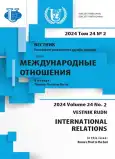Институциональное становление и эволюция деятельности ШОС: опыт ретроспективного анализа
- Авторы: Поршнева О.С.1, Разинков С.Л.1
-
Учреждения:
- Уральский федеральный университет
- Выпуск: Том 24, № 2 (2024): Разворот России на Восток
- Страницы: 264-279
- Раздел: ПРИКЛАДНОЙ АНАЛИЗ
- URL: https://journal-vniispk.ru/2313-0660/article/view/320708
- DOI: https://doi.org/10.22363/2313-0660-2024-24-2-264-279
- EDN: https://elibrary.ru/WQJPKJ
- ID: 320708
Цитировать
Аннотация
Рассматривается институциональное развитие и эволюция Шанхайской организации сотрудничества (ШОС) с 2001 г. по настоящее время. Авторы выделяют и характеризуют этапы и вехи развития организации, а также изучают нормативную базу и организационную структуру ШОС. Показано, что современная организационная структура ШОС, сформировавшаяся в процессе длительной и противоречивой эволюции, включает ряд подсистем, которые наряду с основополагающими принципами деятельности обеспечивают жизнеспособность и развитие ШОС в будущем. Ненаправленный тематический контент-анализ 120 официальных документов ШОС позволил выявить основные направления деятельности ШОС, характер эволюции организации и в конечном итоге этапы ее институционального развития. Первый этап (2001-2004 гг.) связан с институциональным становлением организации, второй (2004-2008 гг.) - характеризуется интенсивным продвижением и минимальной сложностью торгово-экономических, гуманитарных и культурных инициатив. Третий этап (2008-2014 гг.) демонстрирует некоторое ослабление импульса развития ШОС, тогда как четвертый этап (с 2015 г.) обусловлен стремлением вывести ШОС на качественно новый уровень с ростом эффективности сотрудничества во всех сферах. Количественный контент-анализ частоты и динамики употребления репрезентативных ключевых слов одного из видов официальных документов ШОС - деклараций, принятых по итогам саммитов глав государств - членов организации, позволил обосновать тезис о постепенном усложнении, детализации и специализации направлений деятельности ШОС, выявить и охарактеризовать динамику ее приоритетов. В целом контент-анализ показывает, что ШОС в своем развитии прошла несколько этапов, отличающихся качественной спецификой, сохраняя при этом четкий приоритет вопросов безопасности, отражающий значимость традиционных и новых угроз. Сделан вывод о функционировании на платформе ШОС многоуровневого взаимодействия по обеспечению региональной безопасности и сотрудничества при одновременном развитии как многосторонних, в том числе с внешними акторами, так и двусторонних его форматов, что свидетельствует о формировании новой модели регионализма в условиях становления многополярного мира.
Ключевые слова
Об авторах
Ольга Сергеевна Поршнева
Уральский федеральный университет
Автор, ответственный за переписку.
Email: o.s.porshneva@urfu.ru
ORCID iD: 0000-0002-3265-7010
SPIN-код: 1890-6840
доктор исторических наук, профессор, заведующая кафедрой теории и истории международных отношений
Екатеринбург, Российская ФедерацияСергей Львович Разинков
Уральский федеральный университет
Email: s.l.razinkov@urfu.ru
ORCID iD: 0000-0002-0018-7931
SPIN-код: 4251-2344
кандидат исторических наук, доцент кафедры теории и истории международных отношений
Екатеринбург, Российская ФедерацияСписок литературы
- Alimov, R. K. (2018). The Shanghai Cooperation Organisation and Greater Eurasia. International Organisations Research Journal, 13(3), 19–32. https://doi.org/10.17323/1996-7845-2018-03-01; EDN: REGQXV
- Aris, S. (2009). The Shanghai Cooperation Organisation: ‘Tackling the three evils’. A regional response to non-traditional security challenges or an anti-Western bloc? Europe — Asia Studies, 61(3), 457–482. https://doi.org/10.1080/09668130902753309
- Aris, S. (2011). Eurasian regionalism: The Shanghai Cooperation Organisation. Basingstoke: Palgrave Macmillan. https://doi.org/10.1057/9780230307643
- Bin, Yu. (2013). The SCO ten years after: In search of its own identity. In M. Fredholm (Ed.), The Shanghai Cooperation Organization and Eurasian geopolitics: New directions, perspectives, and challenges (pp. 29–61). Copenhagen: NIAS Press.
- Frolova, I. Yu. (2020). Interactions under the umbrella of the four-party mechanism of cooperation and coordination including China, Afghanistan, Pakistan, and Tajikistan. National Strategy Issues, (1), 37–48. (In Russian). EDN: VJMTJH
- He, Baogang. (2020). Regionalism as an instrument for global power contestation: The case of China. Asian Studies Review, 44(1), 79–96. https://doi.org/10.1080/10357823.2019.1691503
- Honrada, G. J. P., & Bokeriya, S. A. (2023). The Shanghai spirit and the ASEAN way as the foundations of a new regionalism. Vestnik RUDN. International Relations, 23(2), 253–264. https://doi.org/10.22363/2313-0660-2023-23-2-253-264; EDN: JKVFZS
- Koldunova, E. V. (2013). The role of Shanghai Cooperation Organization in Central Asia: Comparative analysis of research discourses. Comparative Politics Russia, 4(2), 60–69. (In Russian). EDN: RTKGHZ
- Kulintsev, Yu. V. (2020). The Greater Eurasian partnership: Problems of conjunction with international integration projects (on the example of the Shanghai Cooperation Organization and the “Silk Road Economic Belt” Initiative) [dissertation]. Moscow: Institute of African Studies of RAS. (In Russian). EDN: DNRMXJ
- Li, Xin, & Wang, Yu Xin. (2021). The results of the 20-year economic cooperation of the Shanghai Cooperation Organization and its development prospects. Finance: Theory and Practice, 25(3), 159–174. https://doi.org/10.26794/2587-5671-2021-25-3-159-174; EDN: RRDJZE
- Lukin, A. V. (2007). The Shanghai Cooperation Organization: What next? Russia in Global Affairs, 5(3), 78–93. (In Russian). EDN: TZIZYN
- Luzyanin, S. G. (2017). Russia and China in the SCO 2017: Global and regional dimensions of security. In S. G. Luzyanin (Ed.), The issues in ensuring security in the territory of the SCO (pp. 19–26). Moscow: Ves’ mir publ. (In Russian).
- Luzyanin, S. G. (2019). SCO’s role in the global dimension of the 21st century. In Yu. V. Morozov (Ed.), Prospects for multilateral cooperation between the SCO and international structures in the interests of the organization’s strategy development (pp. 7–16). Moscow: IDV RAN publ. (In Russian). EDN: ETSAEZ
- Marochkin, S., & Bezborodov, Y. (Eds.). (2022). The Shanghai Cooperation Organization: Exploring new horizons. London: Routledge. https://doi.org/10.4324/9781003170617
- Muratshina, K. G. (2017). Central Asian state’s priorities in SCO in the context of their relations with China. Herald of Omsk University. Series Historical Studies, (3), 445–456. (In Russian). https://doi.org/10.25513/2312-1300.2017.3.445-456; EDN: ZSUEKH
- Muratshina, K. G. (2018). Central Asian states and SCO enlargement. Izvestiya of Altai State University, (5), 114–118. (In Russian). https://doi.org/10.14258/izvasu(2018)5-20; EDN: YVNZUD
- Qiu, Xiaofen. (2020). Cooperation between the People’s Republic of China and the Russian Federation within the Shanghai Cooperation Organization. Moscow: Etnosotsium publ. (In Russian).
- Rakhimov, K. H. (2023). Activities of the Shanghai Cooperation Organization to ensure security in Eurasia. Moscow: Ru-Science publ. (In Russian).
- Rakhimov, K. H., & Kurylev, K. P. (2018). The role of the SCO in ensuring the security of Central Asia. Ekaterinburg: Izdatel’skie reshenija publ. (In Russian).
- Rakhimov, M. (2020). Contemporary multilateral relations in Central Asia. Tashkent: Fan publ. (In Russian).
- Song, Weiqing. (2014). Interests, power and China’s difficult game in the Shanghai Cooperation Organization (SCO). Journal of Contemporary China, 23(85), 85–101. https://doi.org/10.1080/10670564.2013.809981
- Zeleneva, I. V., & Vlasov, A. V. (2012). The future of Energy Club the Shanghai Cooperation Organization in the context of the Eurasian integration. Eurasian Integration: Economics, Law, Politics, (12), 150–157. (In Russian). EDN: QAKCOR
Дополнительные файлы









